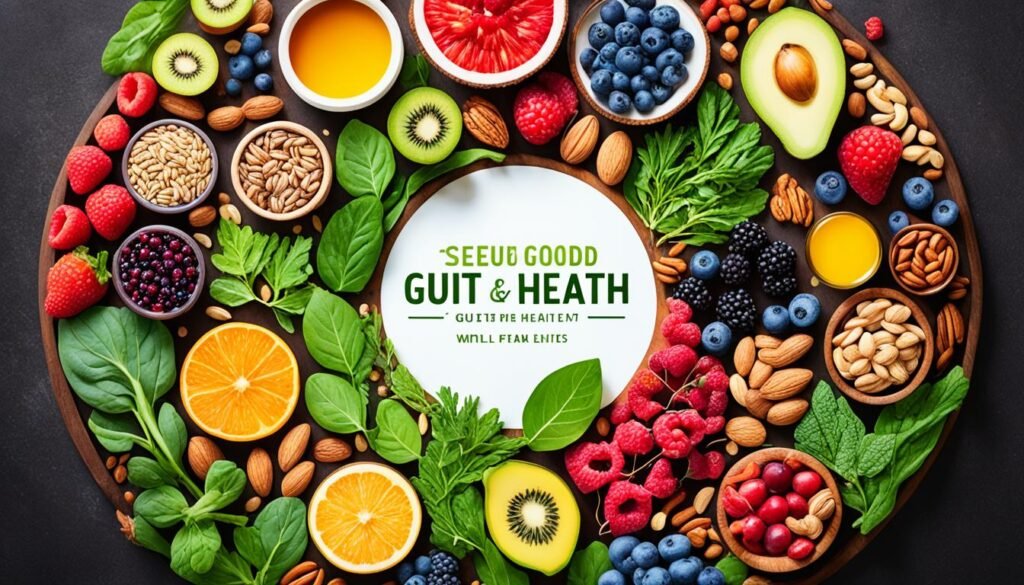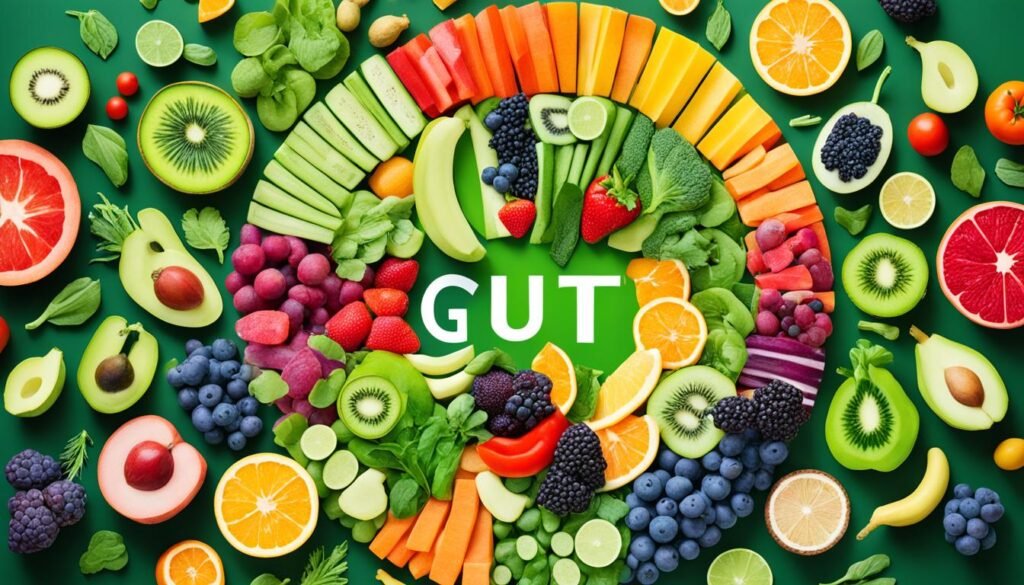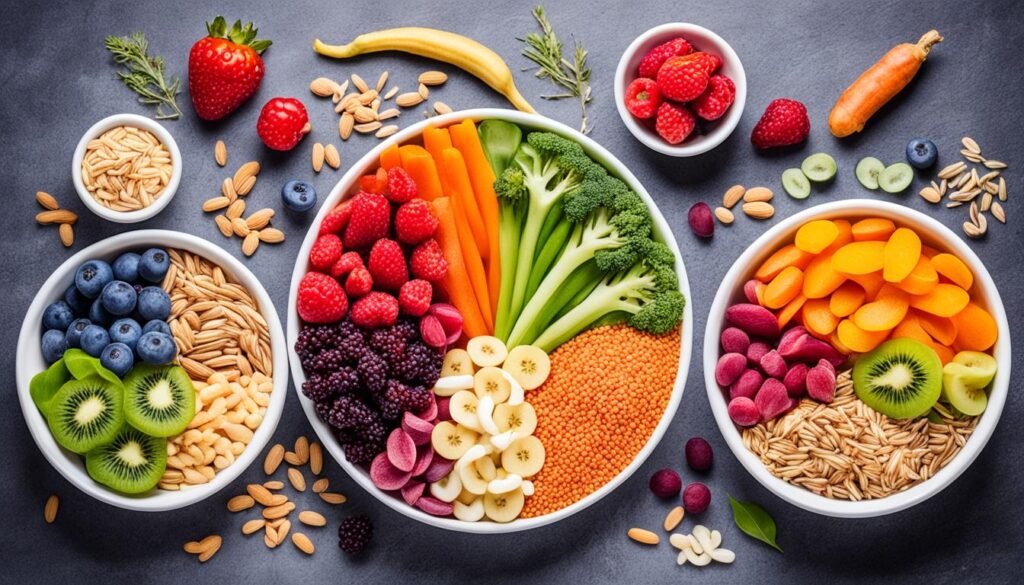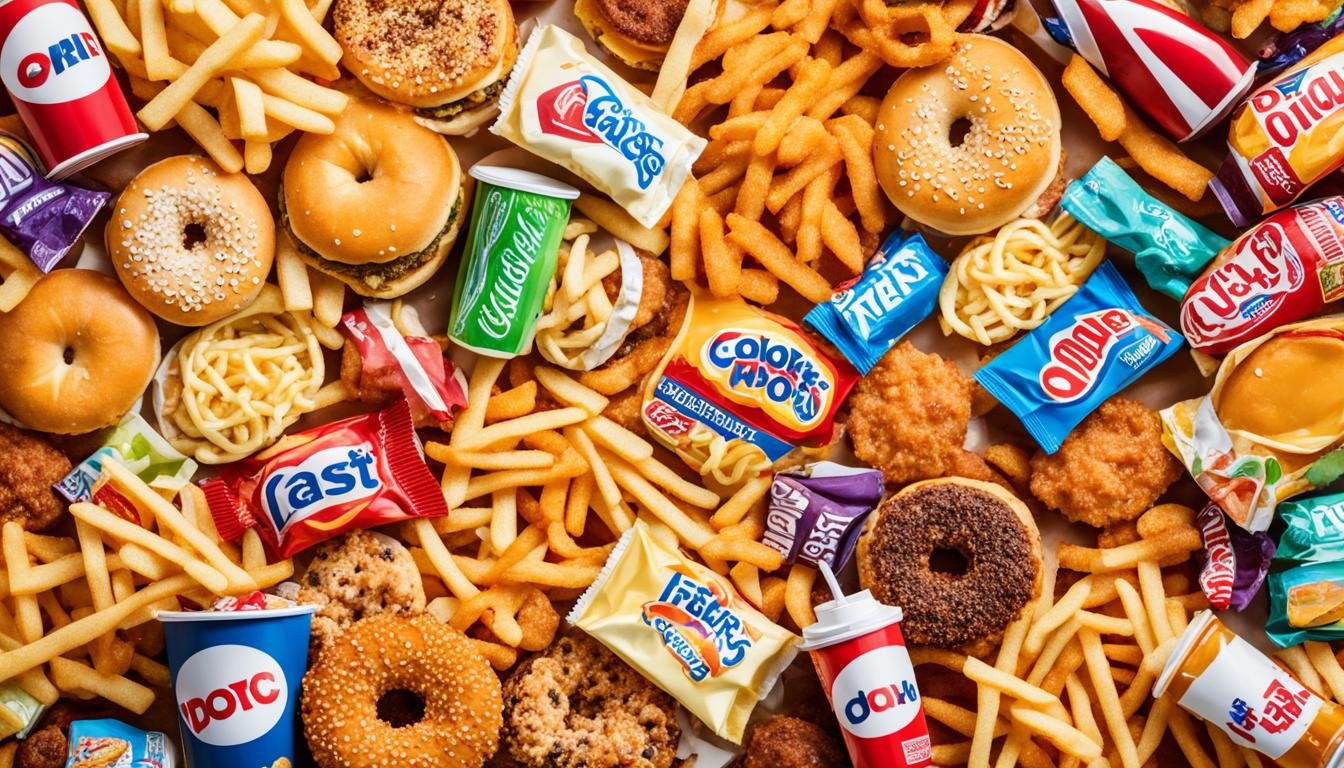Your gut health is crucial for your overall well-being. It aids in digestion and helps absorb nutrients. Plus, it boosts your immune function. Yet, some foods can harm your gut and cause digestive problems.
It’s smart to learn about these foods. Knowing how they could hurt your gut might help you make better food choices. This way, you can keep your gut healthy.
This article looks at foods that might hurt your gut. We’ll also share tips for a diet that’s good for your gut. By steering clear of certain foods and choosing others, you can improve your digestion and feel better overall. Let’s start!
Key Takeaways:
- Your gut health is crucial for overall well-being and can be affected by certain foods.
- By exploring the foods that negatively impact your gut and making informed food choices, you can support a healthy gut microbiome.
- Avoiding these foods and incorporating gut-healing choices into your diet can help maintain optimal gut health.
- Follow a gut-friendly diet to promote gut health and overall well-being.
- Consult with a healthcare professional for personalized advice and recommendations for maintaining optimal gut health.
The 6 Best Foods for Gut Health
A diet that is rich in a variety of plants is very important. It helps your gut stay healthy. Eating the following six foods will boost your gut health and help you feel better:
- Fiber-rich foods: This group includes oats, garlic, and leeks. It also has beans, whole grains, and more. These foods feed the good bacteria in your gut. They’re high in fiber that acts like food for the helpful microbes. This makes your gut healthier.
- Omega-3 fatty acids: Fish like salmon, mackerel, and sardines are full of omega-3s. These fats are good for your gut and they fight inflammation. Less inflammation means your gut feels better.
- Probiotic-rich foods: Foods such as yogurt and kimchi have live cultures. These cultures add good bacteria to your gut. Eating these foods keeps your gut full of helpful bacteria.
- Polyphenols: Berries, nuts, and tea are packed with polyphenols. These help make your gut diverse and healthy. Polyphenols are good for your gut’s tiny world of microbes.
- Vitamin D: Fish and mushrooms are good sources of vitamin D. This vitamin supports the growth of good gut bacteria. It is key to keeping your gut strong and healthy.
Adding these foods to your meals will do wonders for your gut. And a healthy gut is vital for your overall health. So, keep your gut happy and you’ll feel better all around.

The 6 Worst Foods for Gut Health
Keeping your gut healthy means eating the right stuff. But, it’s just as key to avoid foods that hurt your gut. Steer clear of these six to keep your gut in shape:
- Sugar: Too much sugar wipes out good gut bugs, causes swelling, and messes with your gut’s work.
- Processed foods: Foods that are super processed can throw off your gut’s good and bad bacteria mix. This leads to problems like metabolic diseases.
- Soy: Overdoing processed soy can drop the good bacteria in your gut and mess with its balance.
- Dairy: Dairy can change the kinds of bacteria living in your gut. It can make it a good place for bad bugs to grow.
- Red meat: Eating red meat a lot helps certain harmful bacteria in your gut grow. These can lead to weight gain, swelling, and problems with your immune system.
- Fried foods: Too many fried foods, like fried meat, fries, or corn dogs, can mess up the balance of your gut microbes. This can spike your blood sugar and swelling.
Avoiding these bad foods is great for your gut and limits the chances of tummy troubles. Go for foods that are good for your gut. A well-balanced diet is key to a happy gut.
Not Eating a Diverse Range of Foods
Eating many types of food is key to good gut health. Things like fruits, veggies, and whole grains help friendly bacteria grow in our intestines. This variety is important for digestion, immunity, and overall wellness.
Changing what you eat can quickly change the kind of bacteria in your gut. If you often eat the same kinds of food, your gut bacteria might decrease in diversity. This could harm your health.
It’s a good idea to choose a diet rich in plants. This means lots of fruits, veggies, beans, and grains. Such diets provide many important nutrients for the gut, and their fiber helps keep things moving smoothly. This feeds the good bacteria in our intestines.
Adding different whole foods to your diet helps with healthy gut bacteria. This, in turn, helps with digestion, boosts your immune system, and keeps your gut healthy overall.

Mixing plant foods into your meals can greatly help your gut and health. Think of eating a rainbow of fruits and veggies, along with grains, beans, nuts, and seeds. Get creative with your cooking to enjoy meals that are both healthy and tasty.
So, focus on a broad range of whole foods. This simple step can do wonders for your gut microbiome and your health.
Lack of Prebiotics in the Diet
Understanding the importance of prebiotics for gut health is crucial. Prebiotics are a special fiber type. They work as food for good bacteria in our gut. This helps these bacteria grow and work better. You can keep your gut healthy by eating foods rich in prebiotics.
A healthy gut microbiome is vital for good digestion. Foods like lentils, chickpeas, beans, and oats are great examples. Bananas, Jerusalem artichokes, and garlic also top the list. They all have the fiber our gut bacteria loves. It helps them to thrive.
Short-chain fatty acids are an important result of prebiotic fiber. They are like food for the cells in our colon. These fatty acids power up important body processes. They help reduce gut inflammation and the risk of colorectal cancer.
Eating prebiotic fiber regularly is a must for a healthy gut. Try a mix of prebiotic-rich foods. Doing so nourishes your gut bacteria. This support a healthy gut microbiome and keeps your digestion well.

Drinking Too Much Alcohol
Drinking too much alcohol is bad for your gut. It can harm your liver and your health. It also upsets the balance of good bacteria in your gut. This can cause a gut imbalance called dysbiosis, hurting your digestive system.
One study found that chemicals in processed foods harm the gut. This can lead to colitis and other issues. So, it’s wise to watch how much you drink and what you eat for your gut’s sake.
But, not all alcohol is bad for your gut. Drinking red wine in moderation is actually good for it. This is because red wine has polyphenols. These are plant compounds that help good gut bacteria grow.
For your gut, it’s all about being moderate with alcohol. Picking drinks like red wine can help your gut. This way, you can sometimes drink and keep your gut healthy.
If you worry about drinking too much or your gut health, see a doctor. They can give you advice that fits your personal situation.
Antibiotic Use
The Impact of Antibiotics on Gut Health
Antibiotics are lifesavers, fighting infections. But, they can hurt our gut health. Antibiotics can decrease the diversity and composition of the gut microbiome. This can cause a big change in the good and bad bacteria, affecting our health.
The complex mix of bacteria in our gut is key to staying healthy. They help us digest food and and keep our immune system strong. But, when we take antibiotics, they kill both good and bad bacteria. This can throw off our gut’s natural balance.
Short-Term and Long-Term Effects
After taking antibiotics, it can take weeks for our gut to return to normal. Problems like diarrhea or an upset stomach may appear. This shows the immediate impact on our bodies.
What’s more, antibiotics can change our gut for up to two years. This long-lasting effect can reduce our gut’s diversity. It can lead to health issues and affect our overall well-being.
Minimizing the Impact on Gut Health
Using antibiotics wisely is crucial to protecting our gut health. Here’s how we can lessen their impacts:
- Use antibiotics only when needed and as the doctor says.
- Think about taking probiotics or eating foods rich in them while on antibiotics. They can help the good bacteria grow back.
- Eat foods that are good for your gut. Foods like yogurt, sauerkraut, and kimchi are great choices. They are full of live cultures that keep your gut healthy.
- Make sure to eat plenty of fiber. It helps the good bacteria thrive and improves your gut health.
- Always ask a healthcare expert or a diet specialist for advice on how to keep your gut healthy when taking antibiotics.
Thinking about the effects of antibiotics on our gut is important. By focusing on our gut health, we can limit the harm antibiotics do. This way, our overall health stays better.
Conclusion
Maintaining a healthy gut is vital for your well-being. Avoid foods that might harm your gut. Instead, choose foods that can help your gut stay healthy.
Eat foods that are high in fiber and omega-3s. Also, choose foods with probiotics and vitamins. Add polyphenols and vitamin D to your meals as well.
Stay away from too much sugar and processed foods. Skip on soy, dairy, red meat, and fried foods. Be careful with how much alcohol you drink.
Vary what you eat and include foods rich in prebiotics. Think about antibiotic use and talk to a doctor for specific advice. This helps keep your gut happy and healthy.
With these steps, you can maintain a healthy gut. A diet that’s good for your gut is essential. So, look after your gut, and it will look after you!

Your posts are always so helpful.